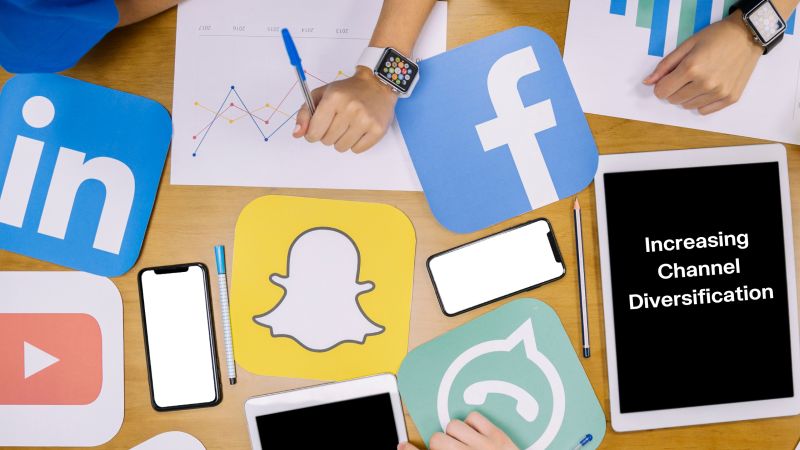The role of social media in search engine optimization (SEO) is multifaceted, evolving, and increasingly significant. As digital marketing landscapes evolve, social media and SEO strategies become more intertwined, necessitating an integrated approach for effective online presence and brand building.
We will explore how social media influences and amplifies SEO efforts, focusing on content amplification, brand presence enhancement, and the indirect impacts on search rankings.
Role of social media in digital marketing

-
Introduction to Social Media and SEO Synergy
Integrating social media in SEO marks a shift from traditional, isolated strategies to a more holistic digital marketing approach. With their vast user bases and dynamic content, social media platforms offer fertile ground for brands to enhance visibility and engage with a wider audience. This synergy leverages social media’s interactive capabilities and SEO’s ability to drive organic traffic, ushering in a more robust online presence.
-
Content Amplification through Social Channels
A key aspect of this synergy is content amplification. When content created for websites or blogs is shared on social media, it reaches a broader audience, increasing visibility and engagement. This amplification is not just about reaching more people; it’s about engaging the right audience that finds value in the content. Social shares, likes, and comments signify content relevance and quality, indirectly influencing SEO through enhanced user engagement metrics.
-
Building Brand Presence and Recognition

Social media platforms are instrumental in building brand presence and recognition. Regular updates, engaging posts, and interactive sessions on social platforms keep the audience engaged and informed, fostering brand loyalty.
This consistent interaction boosts brand visibility and aids in establishing a brand as a thought leader in its niche. Strong brand presence on social media can indirectly influence SEO by increasing brand searches on search engines, signaling to search algorithms the popularity and relevance of the brand.
-
The Indirect Impact on Search Rankings
While social media metrics like likes and shares do not directly contribute to search rankings, their indirect impact is undeniable. High engagement on social media can lead to increased traffic to the main website, longer dwell times, and lower bounce rates, all favorable SEO factors.
-
Enhancing User Experience and Engagement
Social media also plays a paramount role in enhancing user experience and engagement. By furnishing a platform for direct interaction with the audience, brands can assemble feedback, address concerns, and engage in conversations that add value to the user experience. This engagement builds trust and loyalty and provides insights into user preferences and behaviors, which can be leveraged to optimize markeitng strategies.
-
Leveraging Social Listening for SEO Insights

Social listening and monitoring social media channels for mentions and conversations related to a brand are invaluable for SEO. Insights gained from social listening can inform content strategy, helping to create content that resonates with the target audience. Understanding trending topics, audience questions, and concerns can guide keyword research and content creation, aligning SEO efforts with audience interests.
-
The Role of Influencer Marketing in SEO
Influencer marketing on social media also plays a significant role in SEO. Influencers with a significant following can amplify content reach, driving more traffic to the website.
-
Integrating Social Media Data into SEO Analytics
Integrating social media metrics into SEO analytics offers a comprehensive view of a brand’s online performance. By analyzing data from both channels, brands can better comprehend their audience’s online behavior, preferences, and engagement patterns. This integrated analysis can declare and refine SEO strategies, ensuring they are linked with audience needs and behaviors.
-
The Future of Social Media in digital marketing
Social media’s future in SEO will likely see deeper integration and more sophisticated interplay. As search algorithms continue to evolve, emphasizing user experience and content relevance, the role of social media in influencing these factors will become increasingly paramount. Brands that successfully integrate social media and digital marketing strategies are poised to benefit from a more cohesive and effective digital marketing approach.
-
Social Media as a Channel for Content Diversification

Social media platforms offer opportunities for content diversification, which is crucial for digital marketing. Brands can repurpose blog posts into infographics, videos, or short snippets for social media, catering to different user preferences and increasing the likelihood of shared content. This diversification amplifies content reach and helps target different keywords and topics, enhancing the overall digital marketing strategy.
-
The Impact of Local SEO and Social Media
For local businesses, social media plays a critical role in local SEO. Platforms like Facebook and Instagram allow companies to share location-based content, engage with local communities, and promote local events. This local engagement signals to search engines the relevance and authority of a business in a specific geographic area, thereby boosting local SEO efforts.
-
Harnessing User-Generated Content for SEO
User-generated content (UGC) on social media, such as customer reviews, testimonials, and user posts, can be a goldmine for digital marketing. This content provides fresh, authentic material for search engines and enhances keyword diversity and relevance.
-
Social Media as a Tool for Competitor Analysis

Social media also functions as a valuable tool for competitor analysis in SEO. By monitoring competitors’ social media activities, brands can gain insights into their content strategies, audience engagement, and campaign effectiveness. This information can inform and refine a brand’s digital marketing strategy, helping it abide competitive and relevant in search rankings.
-
The Role of Social Signals in Digital Marketing
Although social signals – like likes, shares, and comments – do not directly impact SEO rankings, they indicate content quality and popularity. High social engagement can increase brand exposure and website traffic, indirectly benefiting SEO. Additionally, social signals can influence a brand or website’s perceived authority and trustworthiness, factors that search engines consider.
-
Integrating Social Media Insights into Keyword Research
Social media insights can significantly enhance keyword research for digital marketing. By analyzing the language and phrases utilized by the audience on social platforms, brands can pinpoint new keywords and topics that resonate with their target market. This integration ensures that the content is SEO-friendly and links with the interests and needs of the audience.
The role of social media in SEO is pivotal in amplifying content, building brand presence, and indirectly influencing search rankings. The synergy between these two facets of digital marketing offers a comprehensive approach to reaching and engaging with audiences. Brands that effectively leverage this synergy can expect enhanced online visibility, more robust brand recognition, and enhanced search engine rankings, ultimately ushering in tremendous digital success.
As social media platforms grow and change, so do the strategies for effectively integrating them into SEO. Success lies in comprehending how these two elements interact and leveraging them to create a comprehensive, agile, and audience-focused digital marketing strategy from web20ranker.com/white-label-seo-campaigns/.


